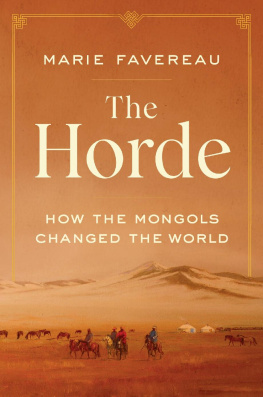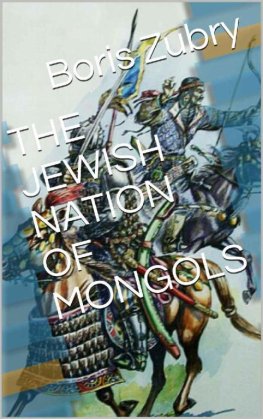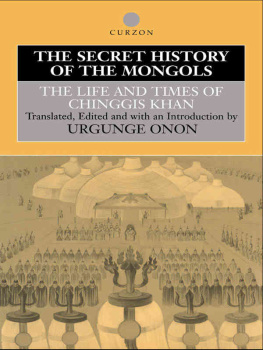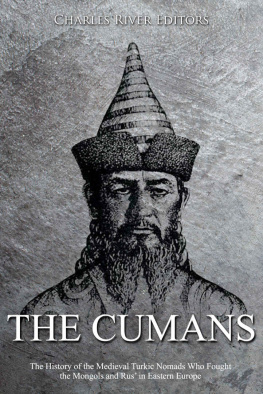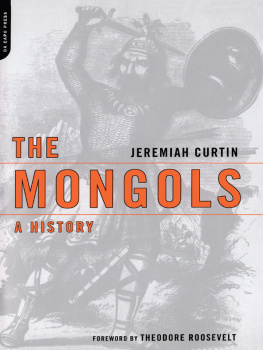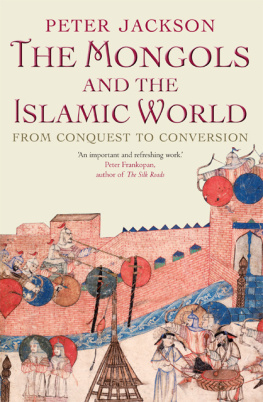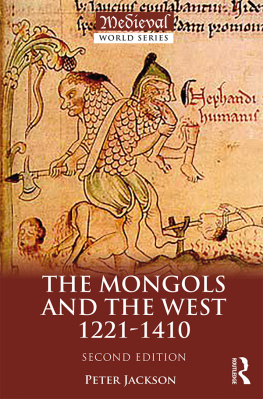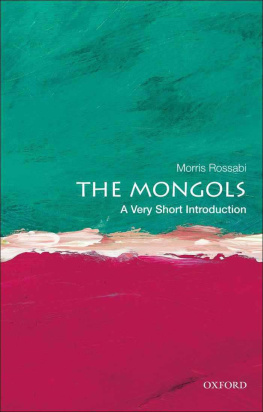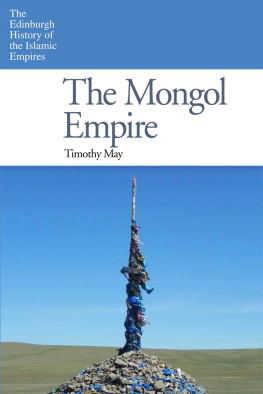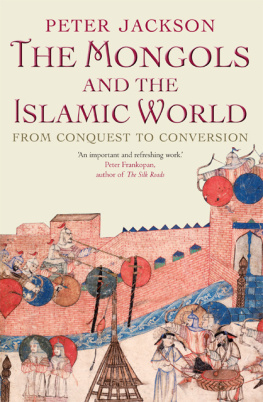The
Horde
HOW THE MONGOLS CHANGED THE WORLD
MARIE FAVEREAU
THE BELKNAP PRESS of HARVARD UNIVERSITY PRESS
Cambridge, Massachusetts
London, England
2021
Copyright 2021 by Marie Favereau
All rights reserved
Cover design: Brianna Harden
Cover art: Ton Koene / Alamy
978-0-674-24421-4 (cloth)
978-0-674-25998-0 (EPUB)
978-0-674-25999-7 (PDF)
The Library of Congress has cataloged the printed edition as follows:
Names: Favereau, Marie, 1977 author.
Title: The Horde : how the Mongols changed the world / Marie Favereau.
Description: Cambridge, Massachusetts : The Belknap Press of Harvard University Press, 2021. | Includes bibliographical references and index.
Identifiers: LCCN 2020043301
Subjects: LCSH: Golden HordeCivilization. | Golden HordeHistory. | Civilization, Mongol. | MongolsHistory.
Classification: LCC DS22.7 .F37 2021 | DDC 950/.2dc23
LC record available at https://lccn.loc.gov/2020043301
Contents
Note on Transliteration
This book includes many terms originating in non-English languages. Most of these terms have numerous acceptable English spellings. I have attempted throughout to prioritize both accuracy and legibility.
Spellings of persons names follow well-established English-language forms (e.g., William of Rubruck, Michael Palaiologos). The common spelling of Genghis Khan, however, is given here under its historically correct form of Chinggis Khan, a usage shared by most historians of the Mongol Empire. I use common Europeanized spellings of titles such as caliph and emir. Place names are also given in common anglicized forms when these are available (e.g., Caucasus, Herat). I sometimes reference current geographic terms (e.g., China, Europe) that may appear anachronistic in context; however, these terms are useful for orienting readers and hopefully wont offend specialists.
For the spelling of Mongolian terms and names, I largely follow the system employed by Christopher Atwood in Encyclopedia of Mongolia and the Mongol Empire. These spellings are based on the Uighur-Mongolian script, as pronounced in the Mongolian language of the relevant time period. In some cases, however, I use more common forms (e.g., Hleg instead of Hle). And in some cases Mongolian terms are given in their Turkic and Russian forms (e.g., tarkhan , yarlik ), in accordance with common usage in the sources and in scholarship.
Arabic words and names have been transliterated according to the system used in the International Journal of Middle East Studies, except that I omit the dot diacritic (e.g., I use h instead of ). In most cases the transliteration of Persian and Turkic words follows the same simplified system. Russian has been transliterated according to the system of the Library of Congress, without diacritics. For Chinese names I have employed the pinyin system.
The Horde was neither a conventional empire nor a dynastic state, even less a nation-state. It was a great nomadic regime born from the Mongol expansion of the thirteenth century, an equestrian regime that became so powerful it ruled virtually all of todays Russia, including western Siberia, for almost three centuries. The Horde was the most enduring regime of all those that descended from the Mongol conquerors. Yet, despite the rich evidence we possess about the Horde, it remains little understood. Far more has been written about the Ilkhanids, the Mongol rulers of the Middle East, and the Yuan, the dynasty inaugurated in China by descendants of Chinggis Khan. The fascinating tale of the Horde remains as though behind a veil.
This book reveals the Hordes story, which begins in the East Asian steppe where, in the early thirteenth century, Chinggis Khan united the nomadsMongols and other steppe peoplesand began building the largest contiguous empire in the world. Chinggis gave four of his sons each his own ulus, his own people, and territory in which to establish themselves. Key to this history is the inheritance of Jochi, Chinggiss eldest and chief heir. Jochi was entrusted with the conquest of the steppe west of Mongolia, a vast region that reaches its ecological limits in Hungary. Jochi, however, slighted his father, and Chinggis stripped his priority to the throne. The consequences were profound. In the 1240s, after Jochi died, his sons, warriors, and their families moved to the temperate zone between the Volga-Ural region and the Black Sea where they established a new kind of Mongol administration, largely independent of the empire. The Jochid pioneers maintained Mongol practices but would never go back to Mongolia. In less than three decades, a few thousand people became hundreds of thousands, creating a sophisticated social organization able to sustain their own imperial formation. This multitude recognized itself as ulus Jochi and referred to their empire as Ordathe Horde.
The Horde was a flexible regime, able to adapt to internal changes and external pressures. The Horde was also wealthy and powerful enough to rule its neighbors and secure autonomy from the Mongol center. Jochid leaders recalibrated relations with the other descendants of Chinggis to maintain stability, and they kept control of the cities and trade routes between the Aral and Black seas, securing critical commercial avenues. Indeed, the Horde dominated Eurasian continental trade and, in the process, shaped the trajectories of Russia and Central Asia until the sixteenth century.
Historians know this mighty and influential regime as the Golden Horde or the Qipchaq Khanate, a reference to the Qipchaq people, prior inhabitants of the lands the Horde took over. These scholars increasingly have recognized the Hordes historical significance and yet rarely have attempted fully to explain it. This book seeks to examine the Horde on its own terms, to grasp how this regime emerged, developed over the centuries, adjusting and transforming while keeping its nomadic character. Importantly, we need to put native concepts, such as ulus, sarai (sedentary cities the nomads built, including a major one called simply Sarai), khan (ruler), and beg (nomadic leaders) front and center to explain the Horde from within.
This book not only captures the obscured social and political nature of the Horde, it also reconsiders the Hordes legacyits impact on global history. In the second half of the thirteenth century, economic exchange intensified, integrating almost all of Eurasia. Today most historians have accepted the notion of a Mongol world empire, coalescing in one ec o nomic system the main subsystems of the Eurasian landmass, roughly divided into East Asia, the Islamic world, the Slavic world, and Europe. Under Mongol domination, faraway regions of the globe came into contact more than superficially and, for at least a century spanning the mid-1200s to the mid-1300s, these regions were linked in a common network of exchange and production. For the first time, people and caravans could travel safely from Italy to China.
Historians used to call this unprecedented commercial boom Pax Mongolica, the Mongol Peace, in reference to the post-conquest stability of the Mongol dominions and the far-flung exchange that stability enabled. Yet, as recent scholarship notes, relations among the descendants of Chinggis Khan were not peaceful. Nor was there peace, exactly, between the Mongols and the peoples they conquered. The notion of peace here should be understood more clearly as conquered peoples acceptance of Mongol domination. But we need not discard the concept just because the word peace is not entirely appropriate. Here I reexamine the Pax Mongolica as the Mongol exchange: a macro-historical phenomenon on par with such world-shaping phenomena as the Trans-Saharan trade or the Columbian exchange. Understood as the Mongol exchange, the global moment created by Chinggis Khans successors comes into focus.

